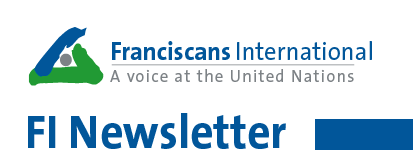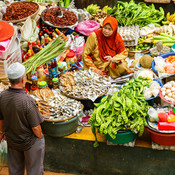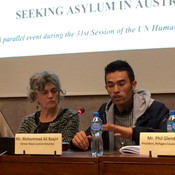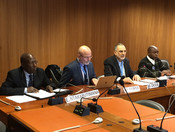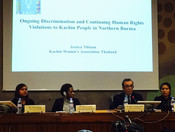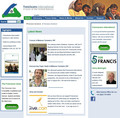This March, Franciscans International was active at the Human Rights Council in Geneva on many fronts, as it continued advocating for more robust legal frameworks for business activities, for greater protections for asylum seekers and indigenous peoples, and for clear commitments from the international community to continue monitoring concerning human rights situations. This month's newsletter highlights some of FI's key activities at the March Human Rights Council. | |||||
Women’s Right to Food: States and Businesses Should Be Held Accountable for Protecting Basic Human Rights
The current economic and development model encourages a food system dominated by agri-business; a system which exploits people, natural resources and exacerbates social and gender inequalities. Local communities are displaced, workers are exploited, rural populations are forced to move to the city as they are faced with unpunished land-grabbing. While States rely increasingly on foreign investment and transnational corporations, they are becoming less inclined to comply with their human rights obligations, leading to unregulated and unsustainable development projects. Coupled with cultural patriarchal practices, this economic model works against women’s equal enjoyment of their rights, and often condemns them to violence. To overcome these structural barriers and violence, women are organizing and advocating for their rights, including the right to food and nutrition, at diverse levels and in all regions of the world. On March 8, 2016, on International Woman’s Day, Franciscans International (FI) joined a group of NGOs and civil society partners, including FIAN (Food First Information Action and Network), in creating a space at the UN Human Rights Council in Geneva to give visibility to specific violations related to the right to adequate food and nutrition. A panel of women’s rights activists from social movements around the world and the UN Special Rapporteur on the Right to Food shared the struggles they’ve encountered in accessing adequate food. From appalling work conditions for women workers in tea plantations in India, to desperate migration in Togo where phosphate mining and land grabbing have displaced entire communities; from the invisibility of women peasants’ work in Spain, to under-nutrition and healthcare discrimination in Guatemala, these women’s stories illustrated not only the gross inequalities that women suffer from, but also the need for greater accountability from States and from transnational corporations to uphold women's human rights. The women’s stories also underlined the interconnections between the right to food and women’s rights. For example, women are often reduced to being families’ main providers of food security and nutrition, based on stereotypes about gender roles. This often results in stark inequalities in access to productive resources and to economic opportunities. But women are much more than mere providers of food, and their rights are key in addressing the right to food. “Women, whether they are peasants, plantation workers, fishers, pastoralists or indigenous, are already challenging the dominant economic and development model and risking their lives to claim their rights,” noted FIAN’s Secretary General, commenting on International Women’s Day. The testimonies of these women echo and strengthen FI in its continued efforts to call for a legally-binding treaty on business and human rights. One of our most basic rights - the right to adequate food, especially for women - is threatened daily by today’s global economic system. States and transnational corporations must be held legally accountable for protecting communities’ most basic rights. | |||||
Australia: Close Down Offshore Detention Centres For Asylum Seekers
Mohammad Ali Baqiri fled Taliban rule in Afghanistan with his brother’s family when he was just ten years old, leaving his parents behind. He came to Australia in 2001 by boat from Indonesia, where he spent three years in Australia’s detention center on Nauru. At that time, all incoming asylum seekers arriving by boat were to be detained in offshore centres while they waited for their application for refugee status to be processed. Although the detention centers closed down between 2008 and 2012, they have now reopened and are still in use at this date. In the Nauru detention center, Mohammad was exposed to several acts of violence and abuse, as he witnessed how Australia’s offshore detention system brought people to hopelessness and acts of self-harm. Many Afghani detainees on Nauru ended up following the Australian government’s urge to go back to their country and were later killed by the Taliban. Those who are still alive are repeating their journey, twelve years later, waiting for a boat in Indonesia to take them to Australia. When Mohammad was finally granted a visa, he was placed directly in 8th grade, with no special English classes to help him. He had to learn English and face the mockery and racism of his peers. Today, Mohammad is 24 and finishing up his law and business degrees at university in Australia. He is using his experience to be a voice for asylum seekers and refugees everywhere, insisting that seeking asylum is a right and not a crime, explaining that people flee their homes out of desperation, not out of choice. Mohammad is seeking to shed light on the inhumane conditions in detention centers, stating that no child should ever go through what he went through. Mohammad addressed the UN in Geneva on Tuesday, March 15th, in a side event to the Human Rights Council, telling his story, and urging the Australian government to comply with its international human rights obligations, to close its detention centers, and to put an end to the business deals that are currently financing the centers. The event, that also featured first hand information about the current situation of women in detention, was organized by Franciscans International (FI), Edmund Rice International, Destination Justice, and ChilOut, a long-time partner of FI that advocates for the rights of children in migration detention. FI has been advocating for the rights of migrants and asylum seekers for the past two years, bringing first hand accounts to the UN and the international community, urging governments, particularly Australia, Thailand, and Mexico to comply with human rights standards in dealing with asylum seekers arriving on their territory. | |||||
Human Rights Council Must Keep Burundi As a Priority
Despite recent efforts by the UN and the African Union to deal with the socio-political upheavals and violence following the 2015 electoral process in Burundi, the human rights and humanitarian situation in the country remains a great source of concern. Armed groups with external backing are threatening socio-political security, and arbitrary detentions, torture, and killings continue to be reported daily. So far, 250 000 people have fled the country. On March 16th, 2016, Franciscans International joined Dominicans for Justice and Peace, Caritas Internationalis, and the World Evangelical Alliance to host a debate at the UN that explored the root causes of the present situation of violence. The panelists, including Michel Forst, Special Rapporteur on the Situation of Human Rights Defenders, attempted to explain the situation, all the while identifying key ways in which the international community could support UN monitoring and recommendations, engage in effective and inclusive processes of mediation, and put in place a protection mechanism to ensure the security of the population. The panelists noted that Burundi had shown several warning signs of the impending crisis, but that the international community had not been quick enough to respond. They also pointed to the lack of trust and real dialogue between government and opposition. Fr Emmanuel Ntakarutimana OP, former chair of Burundi’s National Independent Human Rights Commission noted that economic and social rights had been somewhat set aside in favour of civil and political rights, causing general dissatisfaction and hopelessness among young people who are concerned about their future, leading them to violent political parties. Panelists, echoed by interventions from the floor, called for an increase of external observers and mediators to permit a more inclusive dialogue between factions in Burundi. They asked for the UN to strengthen the monitoring of the country, including giving support to the National Human Rights Commission, and to create mechanisms that reassure the population. The debate ended in urging the Human Rights Council to keep Burundi as a priority on its agenda in order for peace to make its way back to the country, and to allow the large number of refugees, including many journalists, to return to the country in safety. | |||||
Put an End to State-Complicity in Human Rights Violations Against Indigenous Peoples
“We need to wake up to the realities that are not always discussed in the main rooms of the Human Rights Council, “ urged Mr Adrien Zoller of Geneva for Human Rights and Global Training, referring to gross human rights violations perpetrated by States towards minority populations and indigenous people in their territory. Mr Zoller was moderating a panel discussion about on-going discrimination and state-supported violence against ethnic minorities in Asia. Franciscans International (FI) and several partner NGOs hosted the discussion on March 15th at the UN, as a side event to the Human Rights Council, to give leading advocates and human rights defenders in Burma, Japan, and West Papua the opportunity to share their experience and analysis of state policies towards minorities, including indigenous peoples. In all three countries, indigenous people and minorities have experienced arbitrary arrests and violence, including extrajudicial killings, with very limited (if any) access to justice. In Burma, for example, 600 human rights violations have been committed by the army alone, against the Kachin people in the North of the country, and not one case has been brought to justice. In Okinawa, Japan, the local indigenous peoples’ protests against the construction of a new American military base was met with excessive force and arbitrary arrests by the Japanese State, who has never recognised their right to self-determination and stripped them of their language and culture. In West Papua, 2015 holds the record in mass arrests and cases of ill-treatment. Young Papuans are regularly shot at by police forces during peaceful protests, or tortured as political activists, even if there is no proof of political activism. Anyone who criticises the government – indigenous journalists specifically - becomes a target for military violence. Cases are rarely investigated or brought to justice. The panellists agreed that governments should be pressured to putting an end to aggressive and violent measures against their minorities and indigenous peoples, and that close UN-monitoring of each of the three countries should continue. Active for years in advocacy for human rights in West Papua, FI considers the debate as a further opportunity to expose the case of West Papua to the international community and policy makers present for the Human Rights Council. The event allowed indigenous voices to be heard at the UN, empowering grassroots advocates to share their experience and first hand information at international level, where the reality of human rights violations is not always presented so explicitly. | |||||
| |||||
